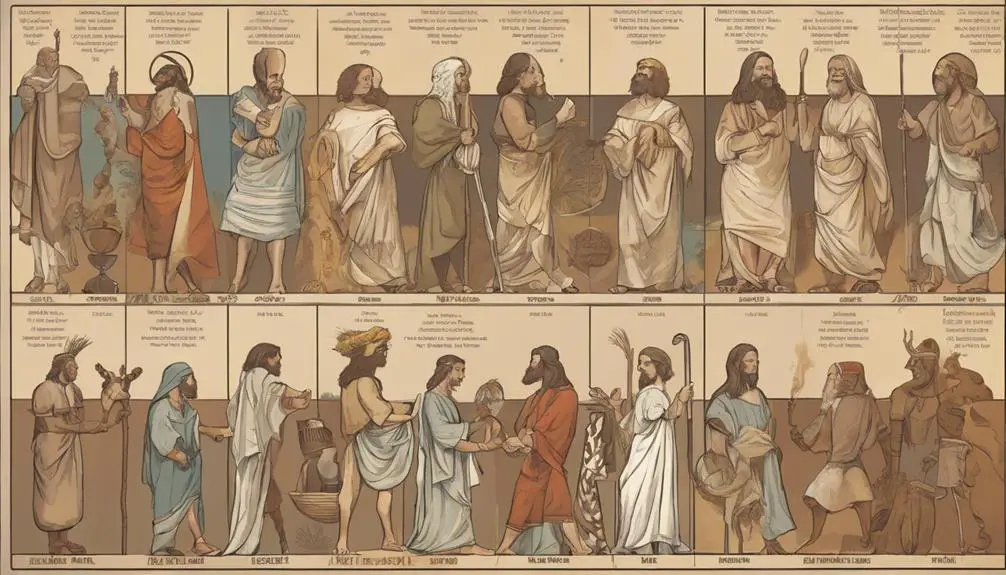Ascertain the multifaceted interpretations of 'The Latter Days' in the Bible, a pivotal term that can transform your understanding of faith and scripture.

The Latter Days in the Bible
You might not be aware that the term 'The Latter Days' in the Bible is open to a multitude of interpretations and has been a subject of theological debate over centuries. It's a concept that pervades both Old and New Testaments, yet its meaning varies depending on the context.
As you explore these perspectives, you'll discover how our understanding of 'The Latter Days' can shape our worldview and influence our faith journey. But don't you wonder, what secrets does this term hold for your personal interpretation of the scripture?
Key Takeaways
- 'The Latter Days' is a prominent concept in the Bible, interpreted differently based on its context in the Old and New Testaments.
- Eschatological themes, or 'end times' concepts, provide important insights into the destiny of individuals and the universe according to biblical prophecies.
- In the Old Testament, 'The Latter Days' are connected to divine judgment, restoration, and spiritual revival, as demonstrated in the works of prophets like Isaiah, Jeremiah, Ezekiel, and Daniel.
- The New Testament, particularly the Pauline Epistles and Jesus' teachings, emphasizes 'The Latter Days' as a period of judgment and rebirth, underscoring the inevitability of these events.
Understanding 'The Latter Days

To fully grasp the concept of 'The Latter Days' as portrayed in the Bible, you need to delve deep into the prophetic texts and their historical context. These scriptures brim with Prophetic Symbolism and Eschatological Themes that require careful analysis and interpretation.
When you study these texts, you'll notice that 'The Latter Days' typically refers to a future period characterized by significant events or transformations, often involving divine intervention. The term is used in a variety of contexts, each enriching our understanding of what these 'latter days' may entail.
Interpreting the Prophetic Symbolism found in these texts is no easy task. It's a complex process that requires a solid understanding of historical and cultural contexts. The symbolism often transcends literal interpretation, making it a powerful tool for conveying profound spiritual truths.
Similarly, Eschatological Themes play a crucial role in these prophetic texts. Eschatology, the study of 'end times', explores the ultimate destiny of individuals and the universe. In the context of 'The Latter Days', eschatological themes provide insight into what the future might hold, according to these ancient prophecies.
Thus, understanding 'The Latter Days' requires a deep dive into the symbolic language and eschatological themes found in prophetic texts.
The Latter Days' in Old Testament

Delving into the Old Testament, you'll find numerous references to 'The Latter Days', each shedding light on this prophetic period from a distinct perspective. The prophets Isaiah, Jeremiah, Ezekiel, and Daniel, among others, employ prophetic symbolism to illustrate the eschatological prophecies tied to this era.
Isaiah's visions, for example, speak of a time when God's judgment will be executed, and a remnant will return to rebuild Jerusalem. Jeremiah, on the other hand, portrays 'The Latter Days' as a time of spiritual awakening, when God's law will be written on the hearts of His people.
Ezekiel's prophecies, filled with vivid symbolism, foretell the restoration of Israel, an event linked to 'The Latter Days'. Daniel's visions offer a detailed timeline of events leading up to this critical period, providing a framework for understanding future prophecies.
These prophetic voices, while distinct, collectively paint a picture of 'The Latter Days' as a time of divine judgment, restoration, and spiritual renewal. Their messages, filled with eschatological prophecies and prophetic symbolism, form a vital part of the biblical narrative, helping us comprehend God's grand design for the end times.
New Testament Perspectives

Shifting our focus to the New Testament, you'll find the concept of 'The Latter Days' continues to hold significant importance, offering fresh insights and perspectives on this prophetic epoch. The Pauline Epistles, letters written by the apostle Paul, provide substantial insights into this theme. Paul's writings often express a sense of urgency and anticipation concerning the 'end times', reinforcing the prophetic significance of the Latter Days.
In addition, one can't overlook Jesus' apocalyptic teachings. He frequently spoke about the end times, offering parables and discourses that indicate a period of judgment and spiritual rebirth. His teachings, like the Parable of the Fig Tree in Matthew 24, underscore the inevitability of these events, urging believers to remain watchful and prepared.
Thus, the New Testament strengthens and deepens the understanding of 'The Latter Days'. Both the Pauline Epistles and Jesus' apocalyptic teachings contribute to a complex, yet enlightening portrait of this prophetic period. Together, they present a compelling image of a time marked by divine judgement, profound change, and ultimately, the promise of a new and eternal age.
Notable Interpretations Throughout History

Throughout history, various interpretations of 'The Latter Days' have surfaced, each offering a unique perspective on this prophetic epoch and its implications for humanity. These interpretations have ranged from apocalyptic predictions to more nuanced prophetic interpretations, each carrying their own significance and merit.
You'll find that apocalyptic predictions often focus on cataclysmic events, painting a picture of end times fraught with calamity and chaos. These interpretations, often derived from a literal understanding of biblical texts, have been a driving force in shaping the perspectives of many religious sects.
On the other hand, prophetic interpretations tend to be more symbolic. They view 'The Latter Days' as periods of significant spiritual transformation rather than literal end times. These interpretations, often seen in the works of early church fathers, have been instrumental in fostering a deeper understanding of the eschatological aspects of the Bible.
Impact on Modern Christian Thought

Building on these historical interpretations, it's crucial to consider how 'The Latter Days' concept has profoundly shaped contemporary Christian thought. This concept has fueled a branch of theology—Contemporary Eschatology—concerned with the study of 'end times'. Your understanding of the Bible's eschatological narratives can influence your worldview and, consequently, your actions and choices as a modern Christian.
You'll find that Modern Prophecies have been significantly affected by Latter Day interpretations. They've shaped ideas about the Second Coming of Christ, the resurrection of the dead, and the final judgment. These prophecies aren't just religious speculations; they've permeated Christian literature, sermons, and even popular culture.
Yet, it's important to approach these prophecies with discernment. While they offer a perspective on future events, they're often embedded in complex symbolic language, requiring careful interpretation. In your exploration of 'The Latter Days', consider its impact on modern Christian thought, but also recognize its historical context and the nuances of its interpretations. By doing so, you'll gain a robust understanding of how this biblical concept continues to shape Christianity.
Frequently Asked Questions
How Have 'The Latter Days' Been Interpreted in Non-Christian Religions?
In Islamic Eschatology, 'the latter days' often symbolize the end times, marked by judgment and resurrection.
Jewish Messianism interprets these days as a time when a Jewish Messiah will rise.
It's interesting to consider these interpretations side by side, as they each draw from their own unique religious narratives and traditions.
Yet, they're both addressing an essential human curiosity about what lies ahead.
Are There Any Scientific Theories That Align With the Biblical Concept of 'The Latter Days'?
You're seeking scientific theories that resonate with the concept of 'the latter days.'
While there isn't a direct link, some argue that prophetic accuracy found in the Bible parallels certain scientific predictions about the earth's future. Climate change models, for instance, can be seen to correlate with prophesied events.
But it's important to remember, these interpretations are subjective and require a leap from pure science to faith.
How Has the Concept of 'The Latter Days' Influenced Contemporary Art, Music, and Literature?
You're seeing apocalyptic imagery and latter day interpretations thriving in contemporary art, music, and literature. Artists often draw from these concepts, reflecting societal anxieties and hopes. They're not just referencing biblical themes, but reinterpreting them for modern audiences.
From dystopian novels to dramatic songs and evocative paintings, this influence is deeply embedded in our culture, providing a rich tapestry of creativity and critical commentary.
What Practical Applications or Moral Lessons Can Be Derived From the Concept of 'The Latter Days'?
You can glean practical applications and moral lessons from the concept of 'the latter days' by focusing on 'End Times Preparedness'. This idea encourages you to live righteously, be prepared for unexpected events, and consider the consequences of your actions.
Studying 'Latter Days Prophecy' can also enhance your understanding of recurring themes in literature, sharpening your analytical skills. So, there's much more to learn from this concept than mere religious teachings.
Can the Concept of 'The Latter Days' Be Interpreted Differently in Various Christian Denominations?
Yes, you'll find different interpretations of 'the latter days' within various Christian denominations. These denominational differences can be quite profound, reflecting divergent theological perspectives and historical contexts.
Some may view it as a metaphorical period, others as a literal end-time event. It's important to engage with these interpretations critically, understanding them within the framework of each denomination's unique doctrine.
Conclusion
You've journeyed through the Bible, from Old Testament prophecies to New Testament perspectives, discovering the significance of 'the latter days'.
The interpretations throughout history, and their impact on modern Christian thought, can't be underestimated.
It's crucial to grapple with these complex themes, as they shape our understanding of eschatology.
Remember, the Bible's latter days discourse provides not only a glimpse into the future, but also profound insights into God's unfolding plan.



Sign up